Key Dates
Registration Period: December 1-7, 2019
Campaign Period: February 13-20, 2020
First Round of Elections: February 21, 2020
Second Round of Elections: April 20-May 20, 2020
Facts and Figures
The unicameral Majles has 290 seats for 31 provinces; 285 seats are directly elected and five are reserved for the following minorities:
- One seat for Zoroastrians
- One seat for Jews
- One seat for Assyrian and Chaldean Christians
- One seat for Armenian Christians in the north of the country
- One seat for Armenian Christians in the south of the country
Each seat represents 190,000 Iranians on average. But Semnan Province, the home of President Hassan Rouhani, has one seat for every 123,000 voters. Alborz Province, which includes the city of Karaj, a massive suburb of Tehran, elects one lawmaker for every 493,000 voters.
Iran officially has 82 national political parties and 34 provincial parties. But party membership is not disciplined, and Iranians mainly vote along factional lines. Individual candidates can also appear on multiple electoral lists. In parliament, lawmakers do not necessarily follow their party leadership.
If no candidate receives at least 25 percent of the vote, a second round of elections will be held with the two leading candidates. The winner is determined by a simple majority.
More than 57 million Iranians are eligible to vote in the 2020 elections, according to Jamal Orf, the deputy interior minister and head of the election committee. Nearly three million are eligible vote in the election for the first time.
Iranian officials predicted a 50 percent turnout, down from 62 percent in 2016 and 66 percent in 2012.
Ballots are manually counted, and results could take up to three days to be finalized.

Vetting Process
- 16, 145 candidates registered with the Interior Ministry during the registration period, which began on December 1.
- To be approved by the Ministry, a candidate must:
- Be an Iranian citizen
- Support the Islamic Republic and pledge loyalty to the constitution
- Be a practicing Muslim (except religious minorities candidates)
- Be in good health and between the ages of 30 and 75
- Hold at least a Master’s degree or the equivalent
- The Guardian Council, an unelected panel of 12 Islamic jurists and scholars, disqualified 7,296 candidates from running. In the majority of constituencies, no reformists were allowed to run. Many former and current government officials, including 90 incumbent lawmakers, mostly moderates and reformists, were initially barred. After appeals, 75 lawmakers were ultimately disqualified.
- The vetting prevented reformists from fielding a candidate in 230 out of parliament’s 290 seats.
- In Tehran, 134 conservative candidates were running against only 28 reformist candidates for the city’s 30 seats. In Mashhad, Iran’s second biggest city, no reformist candidates were on the ballot.
- On February 13, when the campaigning period began, 7,148 candidates were set to compete for 290 seats across 31 provinces. One seat was available for every 17 candidates, according to state media.
Candidates and Lists in Tehran
The outcome in Tehran has long been viewed a “bellwether for elite sentiment in Iran,” according to a report by Harvard’s Belfer Center. Tehran has the largest share of parliamentary seats—30 of 290—of any provincial bloc. In 2016, Rouhani’s coalition won all 30 parliamentary seats in Tehran in a stunning rebuke to Iran’s hardliners. But in 2020, the umbrella coalition of reformists pledged not run an electoral list in Tehran due to the mass disqualification of their candidates. “There is no possibility of fair competition for the deep-rooted reformist camp,” the group said in a statement. A smaller coalition of eight reformist parties, however, decided to field a list. Iran’s conservatives were positioned to dominate the race for Tehran’s seats. But they were divided in days leading up to the election. At least nine conservative factions introduced electoral lists.
(Click here for more information on who and where to watch in the election.)
Conservatives:
The Coalition Council of Islamic Revolution Forces
On February 14, Iran’s conservative coalition presented its final list of candidates. The list was led by Mohammad Baqer Qalibaf, the former mayor of Tehran and former commander of the Islamic Revolutionary Guard Corps Aerospace Force. Mostafa Mir Salim, the head of the conservative Islamic Coalition Party who served as culture minister from 1994 to 1997, was second on the list. Qalibaf and Mir Salim were viewed as rivals for leadership within the conservative movement. Both ran unsuccessful campaigns for the presidency in 2017.
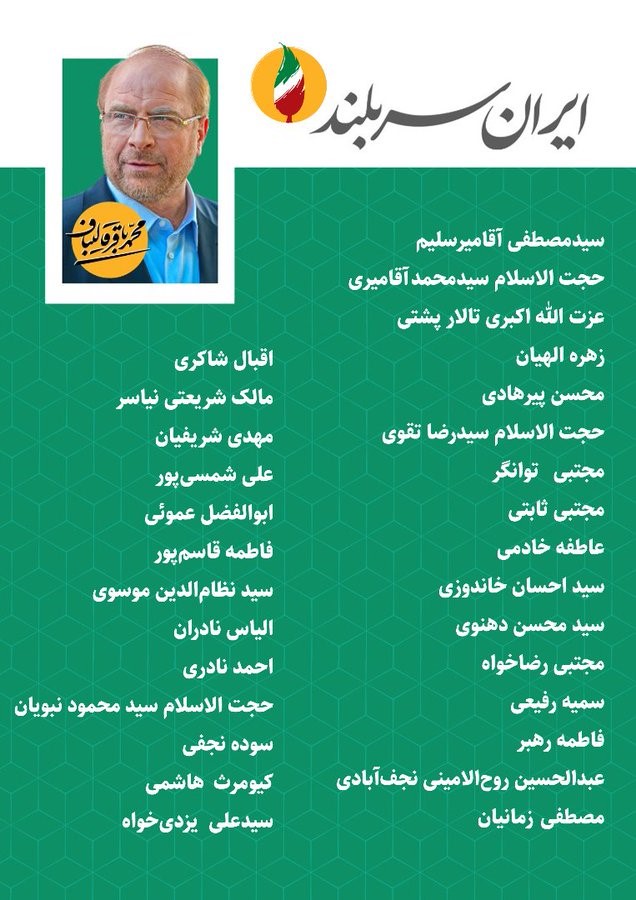
Endurance Front of the Islamic Revolution
The Endurance Front, an ultraconservative party aligned with hardline cleric Ayatollah Mesbah Yazdi, released a final list of candidates that rivaled the more mainstream conservatives on the Coalition Council of Islamic Revolution Forces’ list. Morteza Agha Tehrani, an influential cleric and the party’s secretary general, headed the Endurance Front’s list. Tehrani served as a lawmaker representing Tehran from 2008 to 2016.
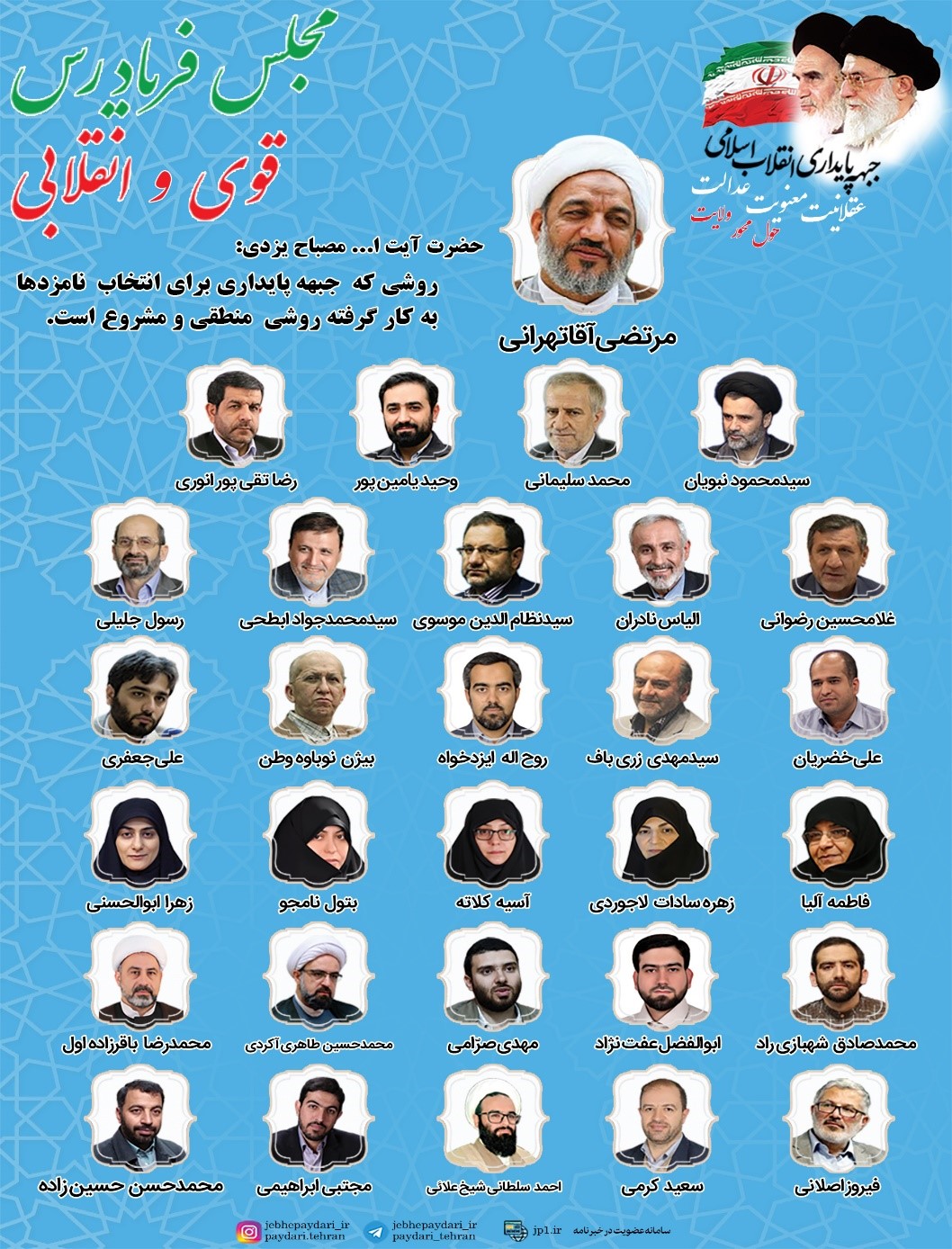
The People’s Coalition
On February 15, the People’s Coalition released a list of 28 candidates for seats in Tehran. The list included several officials and ministers who served under conservative and populist President Mahmoud Ahmadinejad from 2005 to 2013. The coalition did not designate a leading candidate.
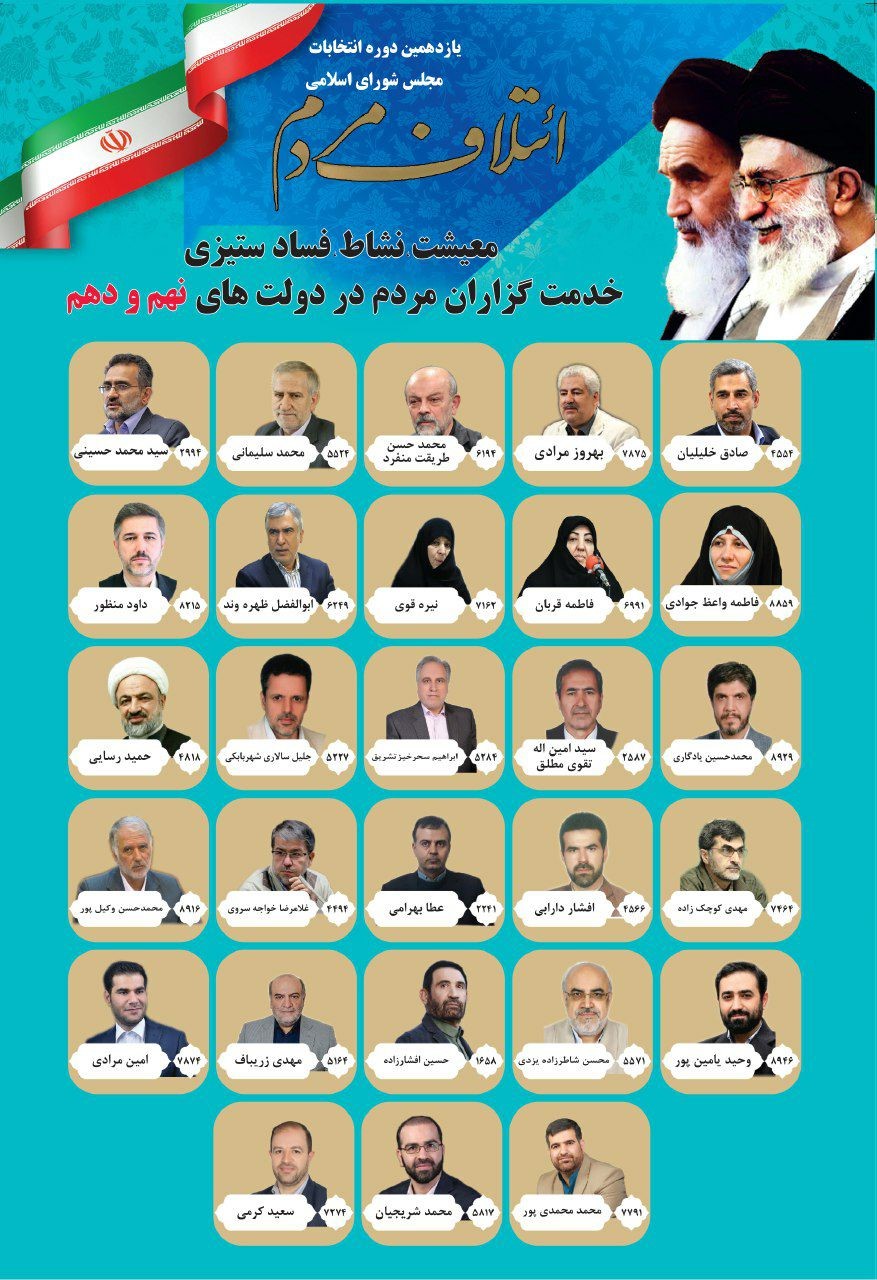
Reformists:
Coalition for the Future of Iran
On February 15, an alliance of eight reformist parties released its final list of candidates for seats in Tehran. The list included Majid Ansari, former vice president for parliamentary affairs and a member of the Association of Combatant Clerics, Mostafa Kavakebian, leader of the Democracy Party and Alireza Mahjoub, the secretary general of the Worker House.
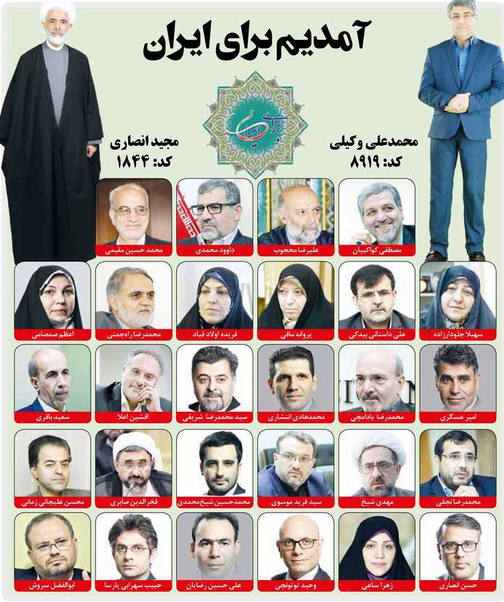
Executives of the Construction of Iran
A second reformist coalition released a list called Yaran-e Hashemi (Supporters of Hashemi Rafsanjani, a former president who died in 2017), which included 30 candidates. The list, headed by Majid Ansari, was comprised of reformist technocrats.
Comments by Politicians and Officials
Iranian leaders have urged citizens to participate in the polls. Even President Hassan Rouhani, who criticized the Guardian Council’s stringent vetting, has encouraged people to vote because the regime cites turnout as a reflection of public support.
Supreme Leader Ayatollah Ali Khamenei
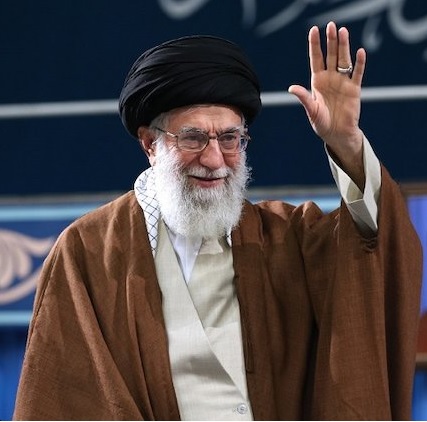
“Election Day is the realization of the people’s civil right to vote. By voting, the nation can exercise their right to participate in the management of their country’s affairs. Moreover, voting is a religious duty. Therefore, everyone who is interested in the national interest participates in the elections.”
“We always recommend that people vote as early as possible in the morning and not postpone voting to the final hours of the evening.”
”People in each city should vote for the required number of candidates in that city. For example, in Tehran, the people should vote for 30 people, as this will greatly contribute to forming a strong Parliament.”
—Feb. 21, 2020, in a speech to the nation after casting his vote
“Today, voting is not only a revolutionary and national responsibility, but it is also a religious duty.”
“Elections are a means to strengthen the country ... A weak parliament will have long-term affects ... a weak parliament will negatively affect our fight against enemies.”
“The election will neutralize American’s ill intentions ... the vote is the Islamic Republic’s prestige.”
—Feb. 18, 2020, in a speech on state television
“Any person who has an affinity for Iran and its security must take part in the elections. Someone may not like me personally, but if they love Iran, they must go to the ballot box."
“The enemies that threaten the country and the people are more frightened of the public’s support than our military capabilities. Yes, they are scared of our missiles, but they are more frightened of the public’s support. Taking part in the elections is a stamp of support for the system from the people, and it will lead to security.”
—Feb. 3, 2020, in a speech on state television
President Hassan Rouhani
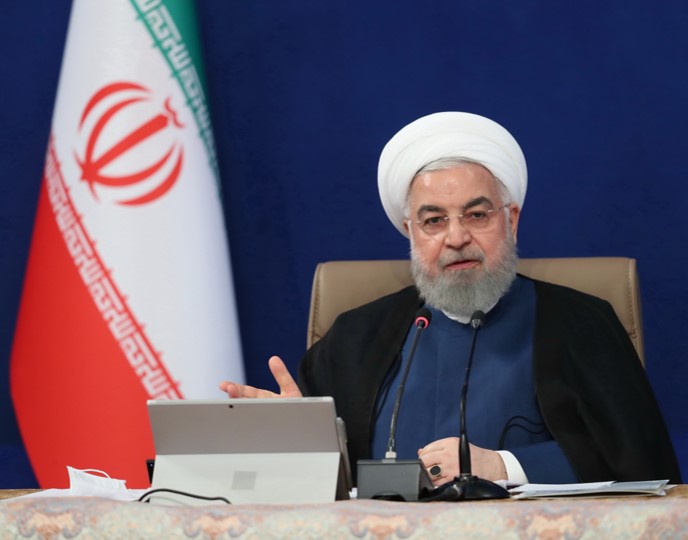
“We are very happy that today, a glorious day will be recorded in the history of our country and our revolution. Fortunately, there is a direct online link between the election office at the Ministry of Interior and all ballot boxes in polling stations across the country.
“Some parts are 100 percent online, some 99 percent, and some 98 percent. Overall, 98% of online boxes are online, and this is a positive point. How many people have voted, how many people are voting, how many voters in Tehran's polling stations, how many districts around Tehran and all the provinces have voted, can be seen here. This is a very good and valuable job done, a well-done electronic identification system.
“We hope that the Minister of Interior will double his efforts, that all the electoral process will be completed in 2021 and that our people will have access to complete digital voting.
“Here I would like to recall 40 years ago, in March 1980, the first parliament elections –of course it was then called National Consultative Assembly, then became the Islamic Consultative Assembly- when the first election was held for the first assembly, of course there was a lot of elections in March of that year. Despite all hardships and problems we had, despite war and all problems that we have had in these 40 years, all elections have been held in due time and this is one of the great honours of our country; a country that has experienced different conditions and experienced war.
“Our great Imam [Khomeini] paid a lot of attention to timely elections without a delay for even one day, and you can see that there has been no gap between these 10 previous elections and the 11th Parliament, which is going to start next year. That is, yesterday the previous parliament is in office and the next day, the new parliament begins and this is not very common in the history of democracy, and in our country, it was not like this before the revolution.
“We are happy that the 11th Majlis is being formed by our powerful people with their very valuable votes, which means that our people are now forming the 11th Majlis with their tastes and votes. God willing, the best of the candidates find their way to the 11th Majlis and what people want is a more active parliament that will resolve people’s problems and make their lives better by enacting laws that are urgent, conducts their job of monitoring, and is bound by the constitutional in monitoring and enforcing the legislations.
“God willing, we will see a very good parliament in the 11th Majlis. All of our parliaments have had ups and downs, but there have been very good parliaments since the first one, which I believe was the best one we have had to date, and we hope that both God and the people will be satisfied with our 11th Majlis.
“I would like to appreciate all the staffs, all those who are managing the ballot boxes today, those who oversee, those who are going to work tonight and tomorrow, those who are providing security for the boxes all over the country, the media who have worked hard these days and invited people to the ballot box. They did a great job. I also thank the noble and dear Iranian nation who have been successful to vote so far, and wish success for those who have are going to go to the polls in the afternoon and by the end of the legal time.
“God willing, our nation will create a new source of pride and our enemies will be disappointed more than ever. Inshallah.”
—Feb. 21, 2020, in a speech after casting his vote
“Americans will not be happy with a high-turnout. Surely they will be happy with a low-turnout election.”
—Feb. 16, 2020, at a press conference
“We should not withdraw from the ballot boxes. The ballot boxes are our savior.”
“I beg you not to be passive.”
—Feb. 11, 2020, in a speech to commemorate the anniversary of the Iranian Revolution
“Do not tell the people that for every seat in parliament, there are 17, 170 or 1,700 candidates running in the election. Seventeen-hundred candidates from how many factions? Seventeen candidates from how many parties? From one party? This is not an election.”
“People need diversity.”
—Jan. 15, 2020, in a televised speech to the Cabinet
Foreign Minister Mohammad Javad Zarif
“As the Supreme Leader said, for the U.S. to wake up to its defeat and come back to the negotiating table, lift sanctions and make up for the losses incurred on the Iranian nation, it needs to know and see that the sanctions have been ineffective and people participate in the elections fervently. This is the biggest boost to the Islamic Republic’s diplomacy to counter the U.S.’ policies.”
—Feb. 19, 2020, on the sidelines of a cabinet session
Ayatollah Ahmad Jannati, head of the Guardian Council
“We did what we were supposed to do, now it is your (voters) turn.”
—Feb. 18, 2020, in a statement, according to Reuters
“The elections on February 21 are very important because the enemies want (the people to) boycott the elections and reduce the turnout.”
“If the turnout is high and competent and efficient candidates are elected by the people, we will witness the formation of a strong parliament and this will increase national solidarity and solve the people's problems.”
—Feb. 12, 2020, in a meeting with the Guardian Council
Guardian Council Spokesman Abassali Kadkhodai
“The Guardian Council follows the laws and regulations parliament has passed at different times.”
“This time, just like at previous (elections), we have tried to properly follow the law."
"The Council has never had a political view... It approaches political factions with closed eyes. What it does judge is the evidence in the cases of the candidates and then it only acts in accordance with the law passed by parliament."
"Our forecast is that we will have a good turnout in the upcoming election, and the average turnout has usually not been under 50 percent, and we will witness a turnout of 50 percent turnout in this election too.”
—Feb. 19, 2020, in a televised news conference
"Brawling to [force the Council to] qualify the unqualified [candidates] is nothing new. It is lamentable that the President has become a pioneer in this unpatriotic project.”
—Jan. 15, 2020, in a tweet
Amirali Hajizadeh, head of the aerospace unit of the Revolutionary Guards
“Each vote put into the ballot box is a missile into the heart of America.”
—Feb. 21, 2020, in a statement, according to Reuters
Government Spokesman Ali Rabiei
"The upcoming elections are the most important elections in the history of the Islamic Republic. The only way to prevent the collapse of Iran is by going to the polls."
—Feb. 3, 2020, at a press conference in Tehran
Jamal Orf, Deputy Interior Minister in Political Affairs
"In this election 7,148 will compete for the parliament's 290 seats... and 7,296 have been disqualified.”
—Feb. 13, 2020, in a statement to ISNA
“There has been no organized initiative inside Iran to boycott the elections. All political groups will prefer to take part in the elections."
"Because of the country's situation and the U.S. economic pressures on Iran, a low turnout has a different meaning abroad, so everyone should try to boost the turnout and eliminate the hinderances to political participation."
"We will have an acceptable turnout if we allow all those who have a right and have different views to take part in the elections.”
—Nov. 1, 2019, in an interview with ISNA
Hesameddin Ashena, senior adviser to the president
Abstention “will only please Iran’s enemies and lead to increased sanctions, an increased probability of military invasion, larger budgets for hired anti-Iranian media, a decline in national resilience and reduced political bargaining power.”
—Feb. 21, 2020, in a speech, according to The Guardian
Mostafa Kavakebian, reformist candidate from Tehran
“If parliament becomes a political monopoly, the institutions parallel to parliament will be doubled in strength. The parliament will be neutralised and the republican aspect of the Islamic Republic system would be a show.”
“We will not let people’s livelihoods get any worse. Our youth are unemployed and want jobs and housing. We should not hide these problems and simply put the responsibility of America, Israel and the Saudis. I know they are not powerful enough to do these things.”
—Feb. 20, 2020, at a campaign rally
